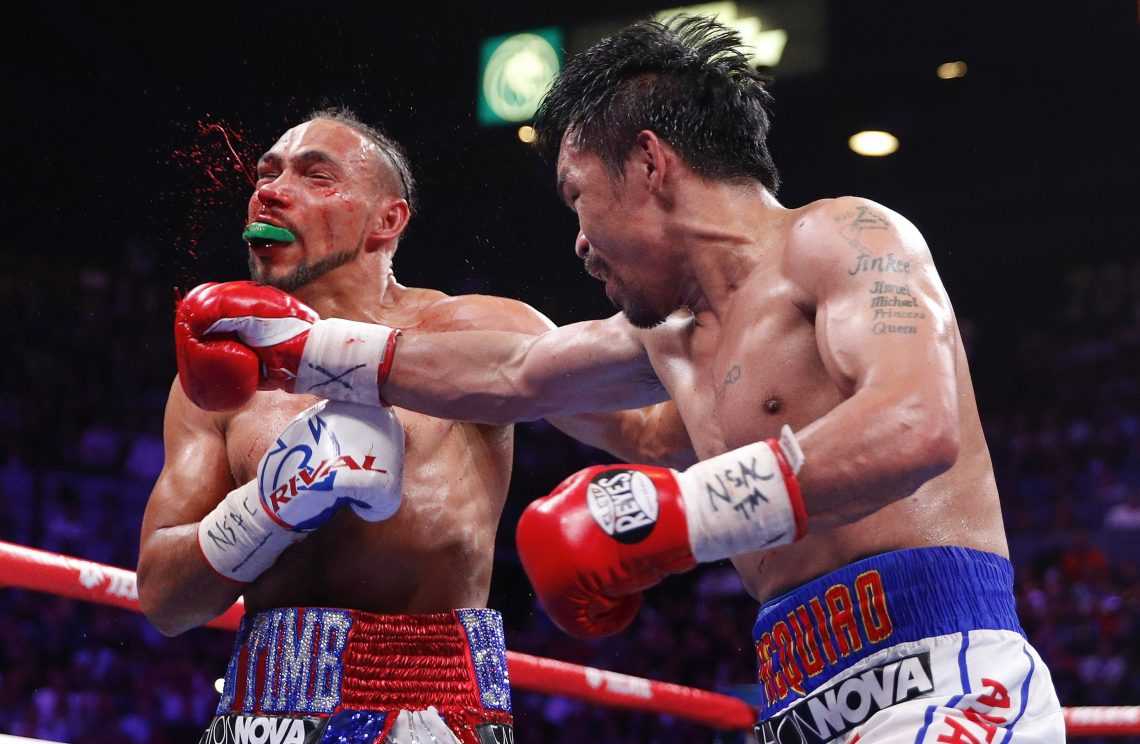A good defense is useless without counter punching. Counterpunching is what separates a beginner from a more seasoned fighter. It’s not easy to pull off successfully but once you master it you will be able to not only damage your opponent physically but mentally. A counter punch is one of the most demoralizing things you can do to a fighter if you can do it repeatedly. If you’re successful at it throughout the fight, you will find your opponent getting frustrated and losing hope, or worse, getting desperate, which will open them up to more counters. This will allow you to inflict more damage and pull away in the fight. Rather than just making them miss a fight, you’re landing one or two shots for every shot they miss and pulling ahead in damage done, as well as punches scored.
Not only that, fighters are most vulnerable in the middle or at the end of a punch because their defense is exposed and they’re mostly focused on offense, which means they’re attuned to punches coming at them. This gives you a much higher likelihood of knocking your opponent down or out. It’s the punch that you don’t see coming that hurts you the most and counter punches, when done correctly, are really hard to see coming.
How to Get Good at Counter Punching
Like anything related to boxing and boxing defense, getting good at counter-punching will revolve around doing more counter punching. It will be a balance between training your body and your mind. You will have to make sure your mind is good at staying relaxed during incoming punches and is able to perceive them coming at you. You will also need to make sure your body is able to respond fast enough to move out of the way of them. The only way to do that is to practice it.
Counter Every Time You Do a Defensive Motion
I often teach my students to counter do a defensive motion every time they punch. When it comes to counter-punching and improving your counterpunch ability, it is the same thing. For every punch you throw in practice, you want to do a defensive motion, followed by a counter punch to that motion. You never want to just defend and admire your work, you want to be able to defend and then make your opponent pay for making the mistake of missing or attacking you in the first place. Basically what you want to do is work on your defense as much as your offense, and include a counter-punching motion in that defense.
The Counter Puncher Drill
This drill can be done during shadow boxing or on the heavy bag and it will get you in the habit of counterpunching. Basically what you want to do is to do a defensive move, followed by a counter punch, followed by another defensive move. You want to do this for every single punch that you throw. Rather than just work on your offense, you want to work on defense and countering off that defense. You want to make each move more efficient, more smooth, and more speed.
Have Specific Goal for Sparring
When you spar, make a deal with yourself that you won’t throw any punch first, but only focus on countering every shot. This will increase the number of times that you are forced to counterpunch, and will force you to focus on counter punching cues and timing in order to improve them. The only time you should throw a punch first when practicing this is to bait an attack from your opponent to counter them. Make sure to not tell anyone else what you’re doing, specifically not your opponent, as this can make them more tentative to attack.
Work on Your Reflexes and Hand Eye Coordination
One thing that’s very important in counter punching is reflexes and hand eye coordination. Working with a good mitt partner can help you with both of these if they throw punches and force you to counter while you guys practice. If you don’t have a coach or partner, you can use tools like the sway bag or the reflex bar to work on these things.
Mistakes to Avoid
When counter punching, there are a few mistakes that you’re going to want to avoid.
Leaving Yourself Open
A lot of boxers think that the counter punch is the end of the exchange, except their opponent doesn’t always agree to this unwritten contract. Never assume you’re going to land your punch because your opponent may be setting up a trap to counter your counter. So never go into a counter punch with a lazy attitude and leave yourself open. A good practice is to always do another defensive move after your counterpunch.
Getting Comfortable
Some fighters like to admire their work after a counter punch and get comfortable and get complacent sitting back and waiting for shots to come at them. This is a good way to lose a fight. This is okay to do when practicing, but never in a real fight as it’s an easy path to defeat. You never want to let your opponent get momentum or always give them the first move. Make sure to be first when you can, even if you’re a counter puncher by nature. You don’t want to assume you’ll be able to put the guy out or dodge every punch.
Throwing Only One Shot
The BIGGEST counter punching mistake out there is only throwing one shot as a counter. This is especially true if your counterpunch lands. When you land a punch on an opponent that’s recovering from throwing his own shot, their eyes are going to close when you counter them and their natural reflex is going to be to try to defend the punch that has already landed, which gives you the perfect opportunity to land the next one. Throwing a second punch after a counter increases your chances of ending the night early.
Counter Punching Moves to Practice
Here we will discuss a few counters that you can execute to help you lander cleaner and harder shots when your opponent is at their most vulnerable.
The counterpunch, by definition, is being able to take advantage of your opponent’s attack. This will usually follow the format of “make them miss, make them pay.”
Slip The Jab
Each defensive move punch can be turned into multiple opportunities to counter. Which of these will be up to you and how you measure your opponent. The positioning of their head, to the positioning of their feet and torso as well as guard. Here are the options for you to counter when you decide to slip the jab.
Straight right
This is probably the easiest to execute and can be really effective if done right because it will be a straight punch, coming from the perfect angle and catching your opponent right on the side of the jaw or the temple. When you slip you want to slip in and to the right, then when you come back you want to push the jab with your head as you come in with the right. You can also follow this up with a left hook to the head to throw them off guard, or if they don’t defend well, put them out completely.
Overhand
Here you will be doing something very similar to what you’re doing with the straight right, except you will be throwing the right overhand and putting the entire weight of your body beyond it.
Right Hook
The same concept here, except you, can go to the head or the body. When you slip the jab you can go low and attack them right in their opening underneath the rib cage, or go to the head. However, you don’t have to stop here, you can also go to the body, then the head. You can see Mike Tyson do this combination often.
Left Hook
The left hook when you slip the jab will be more of an intercepting shot. Very much a “jeet Kune do” like strike. Once you slip the jab you should already be in the momentum of throwing the left hook. This is a masterful shot to set up if you have an opponent who often drops their right hand when throwing a jab, which is a bad habit for many fighters out there.
Slip the Right
When you slip the right, you will have a better chance of landing harder blows since it’s a punch that fighters commit to more than their jab.
Left Hook
The left hook is going to be the standup counter here because it gives you the best leverage. You will have to bend your knee slightly to slip and use all that leverage to come back into your opponent. You can go to the head, to the body, or to the body then the head. You can also throw a left hook, right uppercut combo, or a left hook right hook combo in any variation of the body/head combo. You can go to the head first or the body first with either of the two punches.
Straight Right
This is going to be another intercepting punch, you want to shoot this shot as soon as they shoot their shot just while moving your head out of the way and staying on target.
Overhand
For this, I’ll have you refer to round 3, the last 5 seconds of Mayweather vs Maidana 2 again. This is a shot that is perfect to really catch your opponent off guard. Much like the last shot, it’s an intercepting shot that you throw right when your opponent throws his straight right, but you step in and put the whole weight of your body into the overhand. This counter HURTS, but you have to be fast and intuitive to pull it off.
Right Hook
Another intercepting punch, this one with more precision than the last example. This will allow you to stay tight and follow up with a second punch. If you land a counter on your opponent, it’s always a good idea to follow up with another shot because they are still disoriented. This counter is the perfect opportunity to do that with a left hook to the head or body following the right hook to the head or body.
Ducking Hooks
When it comes to ducking hooks, there are a few options that you have that I love, mostly you want to go with a hook or uppercut. However, there are some intercepting shots that many people miss the opportunity for when it comes to countering hooks.
For example, if your opponent throws the left hook, you will duck under to your right, but as you’re going low, you want to take your left hook or uppercut and dig into their body, and by the time you’re ready to come up, counter with the right hook to the head or body.
Pull Counter
Pull counters are the worst punches to get hit by because you are usually in the middle of a flow of things while you’re getting cracked by it. It’s one of the most demoralizing punches that you can get hit by because it often involves falling for the trap. For the most part, this is going to be a simple counter over the jab or the straight right.
The way you execute this shot is to stick your head forward slightly to put yourself within your opponent’s punching range. 99% of the time, your opponent will take that bait by testing if they can land their jab or straight with it. Be sure to not overreact to their feint as it will give it away and then you will have to reset and try again another time.
As soon as they flick that straight at you, you want to pull back just enough to make them miss and start coming over the top of that punch as they are pulling back. The key is to make it there before, or at the same time as they pull back. As soon as you make contact, you want to get your head off the centerline because it is likely something else coming.
Countering a southpaw
When it comes to fighting a southpaw, a lot of these same counters will work, however, there are two that work specifically well for southpaws.
Left Hook Over Right Jab
When a southpaw (or orthodox if you’re a southpaw) throws the jab at you, you can shoot the left hook over it and connect beautifully. It’s an easy counter to land as you catch their jab, and it creates a beautiful opening for you to follow it up with a right hand. This is the worst nightmare for a southpaw fighter. Or rather, an opponent who has the opposite stance as you.
Slip the Jab, Shoot the Straight
This is the converse of the counter we just mentioned. Pacquiao, a southpaw, actually did this beautifully against Miguel Cotto and that is how he took his jab away. Every time Cotto jabbed, he would slip the jab and then he shot his left hand right into his mouth. This is what you will be doing.
You’re going to slip the jab and shoot your power straight as a counter. Floyd Mayweather also did this beautifully to the southpaw Victor Ortiz. Like the combo above, you’ll have great success if you follow it up with a left hook if positioning and distance allow for it.
You never want to throw a combo you have in mind regardless of circumstance, that’s a rookie mistake. You want to throw shots only when you are in a position to do so and there is a clear opening for it.
Rookies often get fixated on the punch they want to land and put themselves in dangerous situations. Avoid that at all costs.
It Starts With Defense
A good counter-punching game starts with a good defensive game. You can’t be a good counter fighter if you’re not a good defensive fighter. So you want to make sure you work your defense as much as your offense. Once you have that mastered, you want to make sure you’re practicing taking advantage of it. Build those habits in your mind and your body to spot counter-punching opportunities whenever they come and you will become a successful fighter.
Only Way to Get Better is to Do it
The key to getting good at anything in life is to do it more often, as is the key with counter punching. The more you do it, the better you will become, the better you will become, the more you will be able to take your game to the next level, and thus, the more wins you will rack up. Use the tips in this article, your coaches, and all of the tools available to you to improve your boxing game and become a complete fighter.



